语文版中职英语(基础模块 上册)Unit 9《Cultivation》word教案
语文版中职英语(基础模块-上册)Unit-9《Cultivation》ppt课件3讲课稿
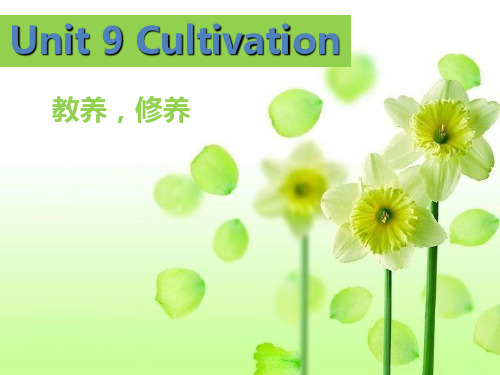
fight with others I will give you 3 minutes to read the text quickly, aWnhdatthheanpupseenseodmineltoehsaeesytheEixsntt?gelmishpewrords to express:
Unit 9 Cultivation
教养,修养
Warming up
WhSamt islinshge dWwoihWhnaeget?nwfyeoilllulinfsegeewel vitlehl riysyoehuxaphprapevyses?ion,
Q1. What will you do to make ห้องสมุดไป่ตู้our friends smile and feel happy?
fight with others
lose his temper
hammer a nail
keep his temper
pull the nail
get on well with others
Homework
1. please read the text 5 times. 2. Summarize and writes down phrases on your
exercise book.
Paragraph 1. There was once a little boy with a bad tempe.rHe often had fights withhis friends. One day, his father gave him a bag of nails and told him to hammer a naiinl to the fence every timehe lost his tempe. rThe boy listened tohis father and did what his father told him to do.
语文版中职英语基础模快上复习教案Unit 9 Cultivation Revision
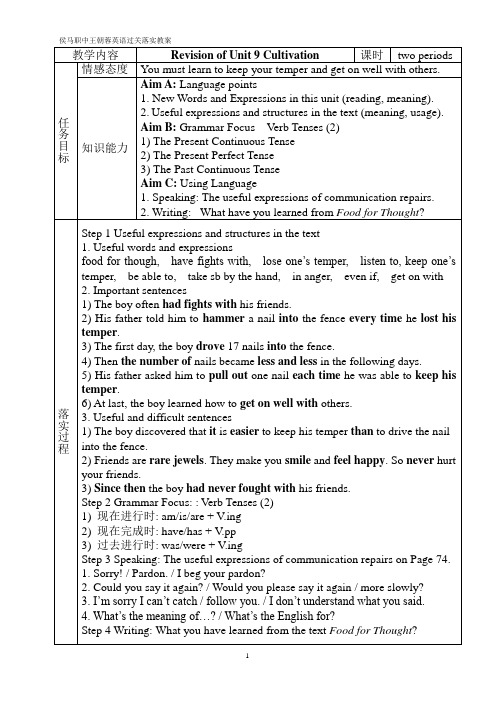
1. Sorry! / Pardon. / I beg your pardon?
2. Could you say it again? / Would you please say it again / more slowly?
教学内容
Revision ofUnit9 Cultivation
课时
twoperiods
任务目标
情感态度
You must learn to keep your temper and get on well with others.
知识能力
Aim A:Language points
1.New Words andExpressionsin this unit (reading, meaning).
落实过程
Step 1 Useful expressions and structures in the text
1. Useful words and expressions
food for though, have fights with, lose one’s temper, listen to, keep one’s temper, be able to, take sb by the hand, in anger, even if, get on with
When we are in trouble, we have tokeep calm.
When we are in anger, we have tocontrol our temper.
语文版中职英语(基础模块 上册)Unit 9《Cultivation》1
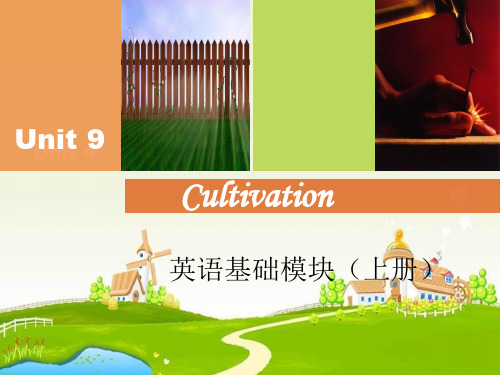
friends Reasons for quarrels How to deal with Friend 1 Friend 2 Friend 3
Listening
❖Activity 1
❖Activity 2
❖Listen to the dialogues
and fill in the missing
words. anything in the room
❖ Mary: Oh, no! Jack , I tgolladssyou not to touch ______________ .
❖ Mary: Do it again?
❖ Jack: I mean I’ll buy ________.
Listening
❖ L09.wav ❖Activity 3 ❖Listen to the tape and choose the
polite and appropriate responsese.
❖ Keys: 1. A 2. A 3. A 4. B
Speaking Communication repairs
Activity 1 Read the dialogue and work in pairs to
act it out with your partner.
Mary: What’s wrong?
Free talk
❖2. Do you sometimes lose your temper when you are in trouble?
英语(基础模块上语文版)教学设计...
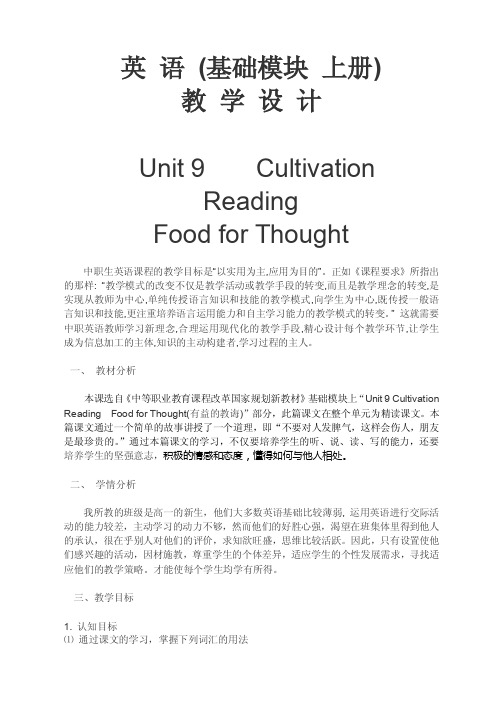
英语(基础模块上册)教学设计Unit 9 CultivationReadingFood for Thought中职生英语课程的教学目标是“以实用为主,应用为目的”。
正如《课程要求》所指出的那样: “教学模式的改变不仅是教学活动或教学手段的转变,而且是教学理念的转变,是实现从教师为中心,单纯传授语言知识和技能的教学模式,向学生为中心,既传授一般语言知识和技能,更注重培养语言运用能力和自主学习能力的教学模式的转变。
”这就需要中职英语教师学习新理念,合理运用现代化的教学手段,精心设计每个教学环节,让学生成为信息加工的主体,知识的主动构建者,学习过程的主人。
一、教材分析本课选自《中等职业教育课程改革国家规划新教材》基础模块上“Unit 9 Cultivation Reading Food for Thought(有益的教诲)”部分,此篇课文在整个单元为精读课文。
本篇课文通过一个简单的故事讲授了一个道理,即“不要对人发脾气,这样会伤人,朋友是最珍贵的。
”通过本篇课文的学习,不仅要培养学生的听、说、读、写的能力,还要培养学生的坚强意志,积极的情感和态度,懂得如何与他人相处。
二、学情分析我所教的班级是高一的新生,他们大多数英语基础比较薄弱, 运用英语进行交际活动的能力较差,主动学习的动力不够,然而他们的好胜心强,渴望在班集体里得到他人的承认,很在乎别人对他们的评价,求知欲旺盛,思维比较活跃。
因此,只有设置使他们感兴趣的活动,因材施教,尊重学生的个体差异,适应学生的个性发展需求,寻找适应他们的教学策略。
才能使每个学生均学有所得。
三、教学目标1. 认知目标⑴通过课文的学习,掌握下列词汇的用法have fights with lose one’s temper keep one’s temper the number of a number of not … at allbe able to⑵理解宾语从句的构成,it 做形式主语的句式⑶能较流畅地朗读课文,理解课文内容,了解文章的中心思想。
语文版中职英语基础模快上复习课件Unit 9 Cultivation Revision
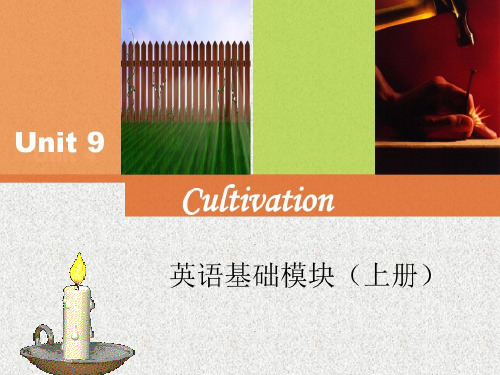
days passed?
5. What do you learn from the text?
Useful phrases and expressions
1. food for thought 2. have fights with 3. lose one’s temper 4. keep one’s temper 5. listen to 6. be able to 7. take sb. by the hand 8. in anger 9. even if 10. get on with
Unit 9 Cultivation
1. What’s in the
picture? 2. What’s in the boy’s hands? 3. What does the
boy want to do?
4. Why does the
boy do like this?
Skimming and Answering
1、用法:过去某一时刻或某段 时间正在进行的动作. 2、构成:was/were + V.-ing 3、动词-ing形式的构成: 1)词尾加-ing; 2)词尾去e,再加-ing; 3)双写词尾,再加-ing;
Daily English
1. How come? = Why? 2. I beg your pardon?
二、一般过去时
1、用法: 1)表示过去存在的状态; 2)表示过去发生的动作; 2、动词过去式的构成: 1)词尾加-ed; 2)词尾加-d; 3)双写词尾,再加-ed; 4)先变y为i,再加-ed; 5)不规则动词的过去式.
三、一般将来时
1、用法: 1)表示将来存在的状态; 2)表示将要发生的动作; 2、一般将来时的构成: 1)shall / will + V; 2)be going to + V; 3)一般现在时表将来; 4)现在进行时表将来; 5)be about to + V; 6)be to + V.
基础模块上Unit9Cultivation

P71 Reading Comprehension
4.What did the father ask him to do each time he was able to keep his temper?
The father asked his son to pull out one nail each time he was able to keep his temper.
in anger keep lose not…at all lead
生气地
保持 丢失
一点也不 带领,引导
the same as as…as… get on with
与……相同
和……一样 与……相处
1.The teacher asked me in anger, ”Why are you
late again?”
(keep-kept-kept lose-lost-lost) 形容词性物主代词:my your his her its
have fights with… fight with…与---打架
(fight-fought-fought)
our your their
P72 Language Study 2.
6.The girl has the same question as yours.
7.I lost my key to the door of my bedroom yesterday.
8.The boys and the girls in og on well with each other.
We should learn to keep our temper when we are in trouble.
Cultivation中职英语基础模块 上册Unit 9课件1语文版
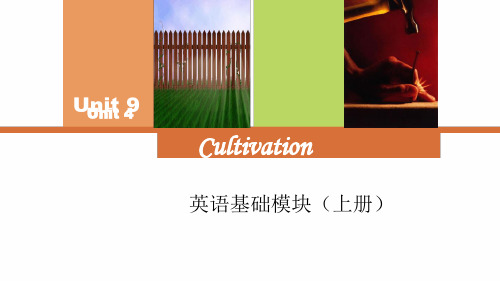
B. Where is my book.
?2. ( ) A. Never mind
B. Don't mind.
?3.( ) A. I'm sorry. It's my fault. B. I didn't do it on purpose.
?4. ( ) A. You must apologize.
?Answers: ?1. show your friends how much you care for
them. ?2. lend an ear to them, share happiness and
open your heart to them.
Warming up
?Activity 5
Free talk
B. That's okay.
?Keys: 1. A 2. A 3. A 4. B
Speaking Communication repairs Activity 1 Read the dialogue and work in pairs to act it out with your partner.
_______.
do it again
?Jack: I'm very sorry about it. I won't
?1. What happened in the house?
?2. What is Jack going to
_____________. ?Mary: Do it again?
do?
Jack: I don't know how to ask that? Mary: You may say: “Would you please say that again?”
中职英语语文版基础模块上册Unit 9 Cultivation 知识点汇总
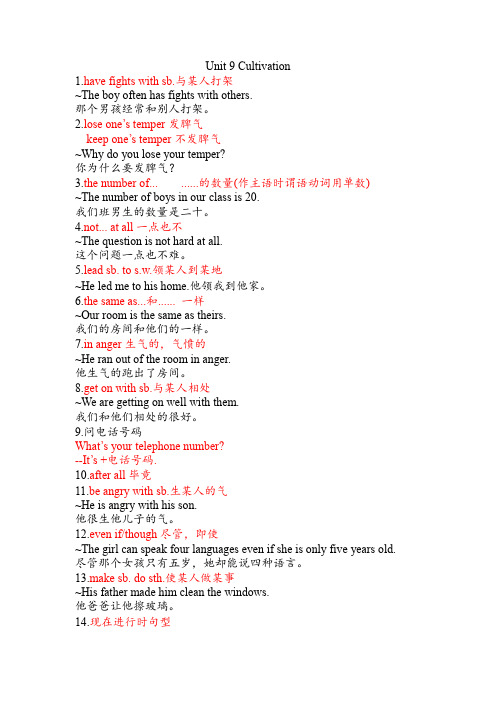
Unit 9 Cultivation1.have fights with sb.与某人打架~The boy often has fights with others.那个男孩经常和别人打架。
2.lose one’s temper发脾气keep one’s temper不发脾气~Why do you lose your temper?你为什么要发脾气?3.the number of... ......的数量(作主语时谓语动词用单数)~The number of boys in our class is 20.我们班男生的数量是二十。
4.not... at all一点也不~The question is not hard at all.这个问题一点也不难。
5.lead sb. to s.w.领某人到某地~He led me to his home.他领我到他家。
6.the same as...和...... 一样~Our room is the same as theirs.我们的房间和他们的一样。
7.in anger生气的,气愤的~He ran out of the room in anger.他生气的跑出了房间。
8.get on with sb.与某人相处~We are getting on well with them.我们和他们相处的很好。
9.问电话号码What’s your telephone number?--It’s +电话号码.10.after all毕竟11.be angry with sb.生某人的气~He is angry with his son.他很生他儿子的气。
12.even if/though尽管,即使~The girl can speak four languages even if she is only five years old.尽管那个女孩只有五岁,她却能说四种语言。
英语基础模块上册unit9cultivation

英语基础模块上册unit9cultivation全文共10篇示例,供读者参考篇1Unit 9: CultivationHey guys, today I want to talk about cultivation with you all. Cultivation means planting and taking care of plants so they can grow big and strong. It's a really important skill to learn because plants give us oxygen, food, and make the Earth look beautiful.First, let's talk about seeds. Seeds are like tiny plant babies that need soil, water, and sunlight to grow. When you plant a seed in the soil, make sure to cover it with a little bit of dirt, then give it some water to drink. Plants love water just like we do!Next, we have to make sure our plants get enough sunlight. Sunlight is like food for plants because it helps them make their own food through photosynthesis. So make sure to place your plants where they can get lots of sunshine every day.But wait, there's more! Plants also need air to breathe, just like us. So it's important not to crowd your plants too closetogether. Give them some space to grow and spread out their leaves.And don't forget to check on your plants regularly. Make sure they're not too dry or too wet, and look out for any bugs or diseases that might harm them. If you see anything wrong, don't be afraid to ask for help from a grown-up or a teacher.Remember, taking care of plants is a fun and rewarding activity. So grab your shovel and watering can, and let's get cultivating! Let's make the world a greener and happier place one plant at a time.That's all for today. Thanks for listening, friends! See you next time.篇2Unit 9 CultivationHi everyone! Today we are going to talk about cultivation, which means taking care of plants and helping them grow. Just like we need food, water, and sunlight to grow big and strong, plants also need these things to grow healthy and happy.First, let's talk about seeds. Seeds are like tiny little magic beans that contain all the information and nutrients needed togrow a plant. But they need some help to start growing. We can plant seeds in soil, water them, and give them sunlight to help them sprout. It's like giving them a cozy little bed to sleep in and some yummy food to eat.Next, let's talk about watering plants. Just like we need to drink water every day, plants also need water to stay hydrated and grow. Water helps transport nutrients from the soil to the plant and also helps the plant create food through a process called photosynthesis. So remember to water your plants regularly, but not too much or too little – just enough to keep them happy.Sunlight is also very important for plants. Just like we need sunlight to stay warm and get Vitamin D, plants need sunlight to make food and stay healthy. So make sure to place your plants in a sunny spot where they can get enough light to thrive.Lastly, let's talk about taking care of plants. Just like we need love and care to grow up happy and healthy, plants also need some TLC. This means checking on them regularly, removing any dead leaves or flowers, and giving them a little boost with some plant food from time to time.So there you have it, cultivation is all about helping plants grow by giving them the right materials and care. Remember tobe patient and enjoy the process of watching your plants grow and flourish. Happy gardening!篇3Hey everyone, today I want to talk about cultivation from our English basic module unit 9. Cultivation is a really cool word that means taking care of plants and helping them grow. Just like how our teacher takes care of us and helps us learn new things, plants need someone to take care of them too.So, when you're cultivating plants, there are a few things you need to remember. First, plants need sunlight to make food. Just like how we need food to grow big and strong, plants need sunlight to make their own food. So make sure your plants get enough sunlight every day.Next, plants need water to stay healthy and hydrated. Just like how we need water to drink, plants need water to keep their roots happy. So make sure to water your plants regularly, but don't give them too much water or they might get sick.Also, plants need good soil to grow in. Just like how we need a comfy bed to sleep in, plants need good soil to put down their roots. So make sure to give your plants good soil so they can grow big and strong.And finally, plants need love and care. Just like how we need hugs and kisses to feel happy, plants need love and care to thrive. So make sure to talk to your plants, sing to them, and give them lots of love.By taking care of plants and helping them grow, we can learn a lot about nature and how to take care of our planet. So let's all become plant caretakers and help our green friends grow big and strong. Remember, just like how plants need us, we need them too. Let's all work together to make our world a greener and happier place.篇4Unit 9 CultivationHey everyone! Today I'm going to talk about Unit 9 in our English basic module book. It's all about cultivation! Do you know what cultivation means? It's when you grow and take care of plants and crops. Isn't that cool?First, we learned about different types of cultivation. We talked about farming, gardening, and even hydroponics! Farming is when you grow crops like corn and wheat in fields. Gardening is when you have a small garden at home and grow flowers or vegetables. And hydroponics is a super cool way togrow plants without soil, just using water and nutrients. How cool is that?Next, we learned about the tools and equipment you need for cultivation. You need things like shovels, rakes, gloves, and watering cans. Oh, and don't forget about the most important tool of all – your green thumb! That's what we call it when someone is really good at growing plants.We also talked about the different stages of plant growth. It starts with planting the seeds, then the seeds sprout and grow into seedlings. After that, the seedlings grow into young plants, and finally, they become mature plants that are ready to be harvested.We even did a fun experiment where we planted our own seeds and watched them grow. It was so exciting to see the little plants pop up out of the soil. I can't wait to take care of my plant and watch it grow big and strong.So, that's all about Unit 9 – cultivation. I hope you learned a lot about growing plants and how important it is to take care of our environment. Let's all be good plant parents and help our little green friends thrive! Thanks for reading, see you next time!篇5Unit 9 CultivationHello everyone! Today I want to talk to you about Unit 9 in our English basic book, which is all about cultivation. Do you know what cultivation means? It means taking care of plants and helping them grow.First, let's talk about the different things that plants need to grow. Plants need water, sunlight, and nutrients from the soil. Just like us, plants need water to stay hydrated and sunlight to make food through the process of photosynthesis. They also need nutrients from the soil to help them grow big and strong.You can help plants grow by watering them regularly, making sure they get enough sunlight, and giving them fertilizer to provide the nutrients they need. It's like taking care of a pet, but instead of feeding it food, you're giving the plant everything it needs to thrive.Another important thing to remember when cultivating plants is to protect them from pests and diseases. Just like how we can get sick from germs, plants can also get sick from bugs or fungus. You can prevent this by keeping your garden clean, removing any dead or diseased plants, and using natural remedies like neem oil or soap spray to keep pests away.Cultivation is not just about taking care of plants, it's also about enjoying the process and watching them grow. It's amazing to see a tiny seed grow into a big, beautiful plant with flowers or fruits. It can be a lot of fun to have your own garden and watch your plants thrive under your care.So, let's all remember to take care of our plants and help them grow big and strong. Cultivation is a great way to connect with nature and learn about the world around us. Let's all be little gardeners and enjoy the magic of watching things grow!篇6Unit 9 Cultivation is such a fun and interesting topic to learn about in English class! In this unit, we will learn all about plants, gardening, and how to take care of them. Isn't that awesome?Plants are really cool because they can grow and change all by themselves. We just need to give them some water, sunlight, and love, and they will grow big and strong. some people even have gardens where they grow flowers, fruits, and vegetables. How cool is that?I remember one time when my parents planted some tomato seeds in our backyard. We made sure to water them every day and keep them in the sun. After a few weeks, we sawlittle green sprouts coming up from the ground. It was so exciting to see them grow and eventually turn into juicy red tomatoes that we could eat. Gardening is so much fun!In this unit, we will also learn about different tools and materials for gardening. We will learn the names of different plants and flowers, as well as how to take care of them. Did you know that different plants need different amounts of water and sunlight? It's so interesting to learn about how to keep them happy and healthy.I can't wait to dive into this unit and learn all about cultivation. I love being in nature and learning about how things grow. I hope you enjoy it too! Let's get ready to explore the wonderful world of plants and gardening together. Let's go!篇7Unit 9 CultivationHey guys! Today I want to talk about Unit 9 in the English Basic Module textbook, which is all about cultivation. Cultivation is a fancy word for growing and taking care of plants. It's super important because plants give us oxygen, food, and make the world a beautiful place.First, let's talk about the parts of a plant. There's the roots, stem, leaves, flowers, and fruits. Each part has a specific job to do to help the plant grow big and strong. The roots take in water and nutrients from the soil, the stem holds the plant up and carries water and nutrients to the rest of the plant, the leaves use sunlight to make food for the plant, the flowers attract bees and other insects to help make seeds, and the fruits carry the seeds so new plants can grow.Next, let's talk about how we can take care of plants. Plants need water, sunlight, and nutrients to grow. We can water plants regularly, make sure they get enough sunlight, and give them plant food to help them stay healthy. We also need to protect plants from pests and diseases that can harm them.Lastly, let's talk about why plants are so important. Plants produce oxygen for us to breathe, give us fruits and vegetables to eat, make our environment beautiful, and provide habitats for animals. So let's all do our part to help take care of plants and make sure they thrive.That's it for today, guys! I hope you learned a lot about cultivation from this article. Let's all do our part to help plants grow and make the world a better place. See you next time!篇8Unit 9 CultivationHi everyone! Today, I want to tell you all about cultivation. Do you know what cultivation means? Well, it's like taking care of plants and helping them grow big and strong. It's really important because plants give us food, oxygen, and make the world a more beautiful place.There are a few things we need to do to cultivate plants. First, we need to plant seeds in the soil. We have to make sure the seeds are covered with soil and water them regularly. Plants need water to grow, just like we need water to stay healthy.Next, we need to give the plants sunlight. Plants use sunlight to make their own food through a process called photosynthesis. That's why it's important to put plants in a sunny spot where they can get plenty of light.We also need to make sure the plants have enough space to grow. If plants are crowded together, they won't be able to get the nutrients and sunlight they need. So, we have to plant them a good distance apart.Lastly, we need to take care of the plants by giving them fertilizer and removing any weeds that might be competing for nutrients. Fertilizer provides plants with extra nutrients to help them grow strong, while weeds can steal those nutrients away.So, remember to take good care of your plants by watering them, giving them sunlight, providing enough space to grow, and tending to them regularly. With a little love and care, your plants will grow big and healthy!That's all for today. I hope you learned something new about cultivation. Bye for now!篇9Unit 9 CultivationHey guys! Today we are going to talk about cultivation in our English class. Cultivation means growing plants and taking care of them. It's super important because without plants, we wouldn't have food to eat or oxygen to breathe!There are many things we need to do to cultivate plants. First, we need seeds. Seeds are like magic because they have all the information to grow a new plant. We can plant seeds in the soil and add some water to help them grow.Next, we need sunlight. Sunlight is like food for plants. It gives them energy to make their own food through a process called photosynthesis. So make sure to put your plants in a sunny spot!We also need to water our plants regularly. Plants get thirsty too, just like us. Make sure not to overwater them though, because that can make them sick. It's important to find the right balance.Don't forget about soil! Good soil is important for plants to grow healthy and strong. You can add some compost or fertilizer to give them extra nutrients.Lastly, we need to protect our plants from pests and diseases. You can use natural remedies like neem oil or eggshells to keep them away.Cultivating plants can be a lot of fun and rewarding. You get to see them grow and change every day. So let's all be little gardeners and help our plants thrive!That's all for today's lesson. Remember to take care of our plants and the environment. Bye-bye!篇10Unit 9 CultivationHi everyone! Today, let's talk about Unit 9 from our English textbook, which is all about cultivation. Cultivation means growing and taking care of plants, like flowers, fruits, and vegetables. It's really cool because you get to watch them grow and change over time.One of the things we learn in this unit is how important it is to water plants. Just like how we need water to survive, plants also need water to grow big and strong. If we forget to water them, they can wilt and die. So remember, always water your plants regularly!Another important thing we learn about in this unit is sunlight. Plants need sunlight to make food through a process called photosynthesis. So make sure to place your plants in a sunny spot where they can get enough sunlight to grow well.We also learn about soil in this unit. Good soil is really important for plants to grow healthy. It should be rich in nutrients and have good drainage so that the roots can soak up all the nutrients they need.In Unit 9, we also learn about different tools we can use for cultivation, like shovels, rakes, and watering cans. These toolshelp us take care of our plants and make sure they have everything they need to grow.So there you have it, Unit 9 is all about cultivation and how we can take care of plants. It's really fun to learn about and it's a great way to appreciate nature and all the amazing things it can do. Have fun cultivating your plants and watching them grow!。
英语基础模块上册unit9cultivation
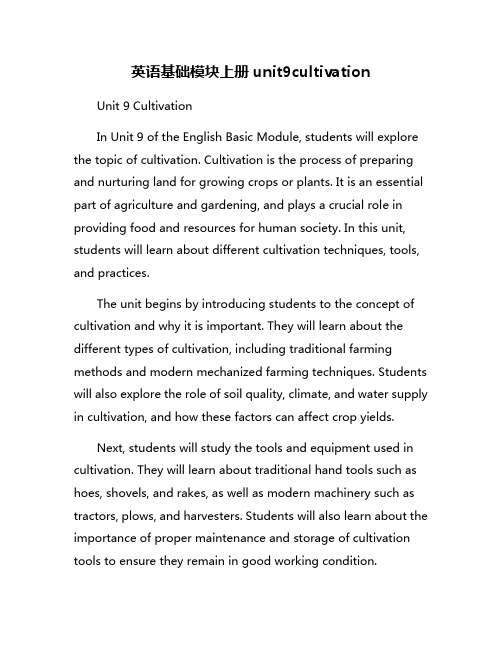
英语基础模块上册unit9cultivation Unit 9 CultivationIn Unit 9 of the English Basic Module, students will explore the topic of cultivation. Cultivation is the process of preparing and nurturing land for growing crops or plants. It is an essential part of agriculture and gardening, and plays a crucial role in providing food and resources for human society. In this unit, students will learn about different cultivation techniques, tools, and practices.The unit begins by introducing students to the concept of cultivation and why it is important. They will learn about the different types of cultivation, including traditional farming methods and modern mechanized farming techniques. Students will also explore the role of soil quality, climate, and water supply in cultivation, and how these factors can affect crop yields.Next, students will study the tools and equipment used in cultivation. They will learn about traditional hand tools such as hoes, shovels, and rakes, as well as modern machinery such as tractors, plows, and harvesters. Students will also learn about the importance of proper maintenance and storage of cultivation tools to ensure they remain in good working condition.In the following lessons, students will delve into the specific practices and techniques used in cultivation. They will learn about soil preparation, planting methods, crop rotation, and pest control. Students will also study the importance of fertilizers, pesticides, and irrigation in cultivation, and how these inputs can help increase crop yields and quality.Throughout the unit, students will engage in hands-on activities and experiments to reinforce their understanding of cultivation concepts. They will have the opportunity to plant seeds, tend to crops, and observe the growth process firsthand. These practical experiences will deepen their appreciation for the hard work and skill required in cultivation.In the final lesson of the unit, students will reflect on the impact of cultivation on the environment and society. They will discuss the challenges of sustainable agriculture, food security, and the ethical considerations of genetically modified crops. Students will also explore ways to promote responsible cultivation practices and support local farmers and communities.Overall, Unit 9 of the English Basic Module provides students with a comprehensive overview of cultivation and its significance in our daily lives. By studying this unit, students will develop a greater appreciation for the art and science of cultivation, andgain valuable knowledge that can be applied in their own gardens, farms, and communities.。
河南省对口升学英语一轮复习课件:中职英语上册(语文出版社)Unit9课文复习
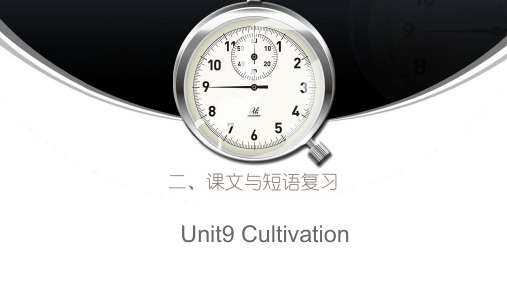
4.在接下来的日子里,我们大家学习越来越努力了。In the following days, all of us studied harder and harder.
5.这个问题一点都不难。The question isn’t difficult at all.
6.要我领你去办公室吗?Shall I lead you to the teacher’s room?
二、课文与短语复习
Unit9 Cultivation
课文理解
发人深思的事
从前,有一个男孩脾气很坏。他常常跟朋友打架。一天,他爸爸给了他一包钉子并告诉他每当他发怒时 就把一个钉子钉到墙里面。这个男孩听了他爸爸的话并且照做了。
第一天,这个男孩钉了17个钉子。然后,在接下来的一些天,钉到墙上的钉子数目变少了。这个男孩发 现忍住脾气要比告诉了他爸爸这个 情况。然后他的爸爸让他每次忍住脾气时就从墙上拔出一个钉子。
几天过去了,这个男孩最后告诉他爸爸所有的钉子都拔完了。这位爸爸拉着孩子的手到墙边,对儿子说: “你干得很好,但是,你看看这面墙上的这些洞,这面墙再也不能跟以前一样了。当你生气时,你所说 的话将会给你留下疤痕就像墙上的洞一样。即使你说抱歉,这个伤口永远在那里。如果你用言语伤害了 某个人,内心的伤害将跟身体的伤害一样。朋友是珍宝,他们让你微笑感到高兴。因此,不要伤害你的 朋友。”
课后注释句子检测
1.他有时跟别人打架,我们不 喜欢他。
2.你为什么发脾气?
3.学校里的教员数量是240人。
4.在接下来的日子里,我们大 家学习越来越努力了。
5.这个问题一点都不难。
6.要我领你去办公室吗? 7.你们的教室跟我们的一样。 8.她生气地跑出教室。 9.我们互相之间相处地很好。
- 1、下载文档前请自行甄别文档内容的完整性,平台不提供额外的编辑、内容补充、找答案等附加服务。
- 2、"仅部分预览"的文档,不可在线预览部分如存在完整性等问题,可反馈申请退款(可完整预览的文档不适用该条件!)。
- 3、如文档侵犯您的权益,请联系客服反馈,我们会尽快为您处理(人工客服工作时间:9:00-18:30)。
Unit 9 Cultivation---Period1 Warming up and Reading教学目标设计Knowledge Aims: have fights with, lose one’s temper, keep one’s temper, the number of,a number of, not … at all, be able to目标设定依据1.学情分析Students are new term here; they want to know how they friends feel and how they spend their holiday. So they have more interesting to learn this unit. Teacher should help learn this unit well.2.教材分析This period opens with a picture presenting the new function in real world setting. This article introduces the target language.1a. introducing the key vocabulary and the idea of making predictions1b. giving students practice in understanding the target sentences in practice重点难点1.Key words and expressions2.Translate the important sentences3. Get the students to learn different reading skills.教学过程设计自学内容安排StepⅠ: Greeting to the studentsT: Good morning, class!Ss: Good morning, teacher!StepⅡ: Lead-in Warming upa. Think about the following questions:Q1:What will you do to make your friends smile and feel happy?Q2: Do you sometimes lose your temper when you are in trouble?Q3: How can you get on well with others?Ss can discuss these questions together. When they discuss they can speakin English or Chineseb. Teacher sum up the conclusions that Ss discussed. Then give them a properanswer and go into the picture.c.Teaching students the new sentences, new words and new expressions in thepicture. Teacher reads, and students follow.StepⅢ: Review the greetings and lead—in the readingAsk students the following questions so as to begin to focus students’ attention on the main topic of the reading passage.Q: What is your opinion of friendship?StepⅣ: a. Ask questions of the picture in the text, and then lead in the title of the reading Food for thought.Q1. What’s in the picture?Q2. What’s in the boy’s hands?Q3. What does the boy want to do?Q4. Why does he do like this?b. Listening to the textc. Have the class to read the passage loudlye. Then let the students answer the questionsStep V: Learn new words and expressionsa.Divide students into groups and ask them to read new words and expressionsone anotherb.Learn key words by making up sentences1. Food for thought2. He often had fights with friends.Have f ight with… 与某人打架3. every time he lost his temper…E.g. Every time I saw him, he was reading a book.Lose one’s temper 发脾气Keep one’s temper 忍住脾气,心平气和E.g. you must learn to keep your temper, or you can’t get on well with others.4. Then the number of nails became less and less in the following days. Thenumber of … 的数量E.g. Since then the number of wild animals has greatly increased. Little ,less,least less and less 越来越少In the following days 在接下来的日子里5. The boys discovered that it is easier to keep his temper than to drive the nailsinto the fence.Keep one’s temper 控制脾气,不发脾气6. Finally the day came when the boy didn’t lose his temper at all. Not …at all一点也不。
E.g. this question is not difficult at all.7. His father took his son by the hand and led him to the fence.Take somebody by the hand 抓着某人的手Lead。
to …领某人到8. The fence will never be the same as it was before.Be the same as 与。
相同E.g. Your classroom is the same as ours.9. When you say some words in anger, your bad temper will leave a scar just likea hole.In anger…生气的E.g. She ran out of the classroom in anger.10. Even if you say you are sorry, the wound is still there.Even if /though 虽然尽管We like English even if it is rather difficult for us.11. They make you smile and happy.Make 使让E.g. You must make him work better.StepⅥ: Reading aloudPlay the tape of the passage for the students to listen to and followStepⅦ: Post—readingGet the students to do the exercise in the reading comprehension.StepⅧ: Consolidation and Homeworka.Book shuts. Get the students to retell the article and useful sentences.b.Homework1. Practice the greetings after class2. Try to retell the passage3. Finish off the related workbook exercises4. Use “there be” to describe your school!Unit9. Cultivation---- period 2 Language studyKnowledge Aims: 1. Get the students to learn and grasp some important new words andexpressions2. Get the students to learn and grasp the sentential forms:ThePresent Continuous Tense(现在进行时), The Past ContinuousTense(过去进行时),The Present Perfect Tense(现在完成时) Emotion Aims: Get the students not to be afraid of grammar learning.目标设定依据学情分析Students often feel grammar very abstract and boring, so it is necessary to make the class lively and interesting. Example sentences and grammar summary should be carefully designed so as to make it easy for students to understand and accept.教材分析This part introduces the target language and grammara.introduce the key grammar and idea of making predicationsb.give students practice for understanding the target grammar in practice.教学重难点eful words and expressions2.Grammar: The Present Continuous Tense(现在进行时), The Past ContinuousTense(过去进行时),The Present Perfect Tense(现在完成时)教学过程设计StepⅠ: Revisiona.Check the homework exerciseb.Have a dictation to write some important words and expressionsStepⅡ: a. Get the students to complete the following sentences with the correct form of the words or expressions in the box.b. Explain the problems the students meet while checking the answers.StepⅢ: Grammar现在进行时The Present Continuous Tense1.时间:现在,此刻(now)2.动作状态:正在进行3.动词变化:助动词动词变化: 表时) 一单: 动词变化助动词be(表时) 一单am 表时二/复:are 复三单: 三单:is 实义动词(表态): ):V-ing:①+ing②去e+ing实义动词(表态): : ②两辅夹一元,双写最后一个字母+ing③两辅夹一元,双写最后一个字母4.句型变化: 句型变化: 句型变化肯定句型: 肯定句型:主+ be + v-ing……否定句型: 主+ be + not + v-ing……疑问句型:be + 主+ v-ing……? ?E.g.: Listen! She is singing an English song. ! 听,她正在唱英语歌.Look at the picture. The children are flying kites in the park. 看这幅图,那些孩子正在公园放风筝.They are playing basketball now. 现在他们正在打篮球.We are waiting for you. 我们正等你呢. 我们正等你呢.过去进行时(The Past Continuous Tense)1. 时间:过去2. 动作状态:正在进行3.动词变化:助动词be: 一单三单:was 一单/三单三单: 动词变化:助动词二/复:were 复实义动词: 实义动词:V-ing4. 句型变化:肯定句:主+ was/were + v-ing……否定句:主+ was/were + not +v-ing……疑问句:was/were + 主+ v-ing……? ?e.g. I was doing my homework at 9 p.m. last night. 昨天晚上九点我在写作业.She was washing her clothes when her mother came in. 当她妈妈进来的时候,她正在洗衣服. We were watching TV from seven to nine last night. 昨天晚上七点到九点我们正在看电视. What were you doing this time yesterday? 昨天的这个时候你在干什么?现在完成时( 现在完成时The Present Perfect Tense)1. 时间:过去2. 动作状态:过去完成的动作对现在造成了影响或3. 动词变化:助动词:三单:has 动词变化:助动词:三单: 一单/二复一单二/复:have 实义动词:V-过去分词4. 句型变化: 句型变化: 肯定句: 过去分词……肯定句:主+ has/have + v-过去分词过去分词否定句:主+ has/have + not + v-过去分词疑问句:has/ have + 主+ v-过去分词eg: She has learnt English for 3 years. 她学英语已经三年了.They have lived here since 1990. 自从1990年起他们就住在这.She has already finished the work. 她已经完成了她的工作.Have you ever ridden a horse? 你曾经骑过马吗?I have stayed in Beijing for two years. 我在北京呆了两年了.StepⅣ: 1. Get students to fill in the blanks of Grammar Focus2. Check the answersStep V: Homeworka.Finish off the related workbook exercisesb.Write down the sentences in language studyUnit 9 Cultivation--- Period 3 Comprehensive language Skill Listening教学目标设计Knowledge Aims: 1.Get students to learn new words and expressions.2. Get students to know communication repairsAbility Aims: 1. Enable the students to listen and understand the listening materials2.Develop t he students’ listening ability目标设定依据学情分析Through listening and exercise, students know communication repairs. In this way, students feel that they have ability to communication.教材分析This period opens with two pictures presenting the situation of greetings, introducing and leaving taking.重点难点1.Develop the students’ listening ability, especially listening to and understanding key words and speakers’ attention and attitude.教学过程设计StepⅠ: RevisionCheck the homework exerciseStepⅡ: a. Introduce the picture to the students.b. Let students to talk about the picture.c. Play the tape of the picture for the students then check the students’ answers.d. Get the students to scanning the second part of the listening.e. Play the tape of the passage for the students, let then listen to what they aretalking about and fill in the missing words according to what they have heard.f. Listen to the tape and choose the polite and appropriate responsesStepⅢ: a. Check the answers.b. Play the tape again and let the students read after the tape.c. Ask the students read the whole passage.StepⅣ: Homeworka. Finish off the workbook exercise.b. Write down the whole passage after class.Unit9. Cultivation---Period 4 Speaking, Reading and Writing教学目标设计Knowledge Aims: 1. Get the students learn some useful expressions about2. Get the students to learn the English Alphabet well3. Get the students to learn the abbreviations wellAbility Aims: 1. Develop the students’ speaking ability by making and acting2. Develop the students’ writing ability3. Get the students to learn to collect useful ideas and sentences byusing the brainstorming way or making a poster.目标设定依据学情分析Students in this age are shy to open their mouths. So in this period should be placed on developing students’ speaking ability. Make sure that after learning this period, students are willing to speak English. For the poor learners, after this period learning, they could read and write the English Alphabet skillful and they could copy write a composition.教材分析This period opens with a new function in real-world setting and copy write a compo- sion It mainly introduces the basic oral English and the class situation.重点难点1.Develop the students’ speaking ability by making and acting dialogues.2.Enable the students to have ability to communicate with others in English.3.Develop the students’ writing ability by making a brainstorming map and a poster.4.Get the students to learn to use connecting word and sentences properly to arrangesentences correctly教学内容安排StepⅠ: Revision1.Check the homework exercise2.Ask some students ro play the dialogue that learnt last classStepⅡ: Lead—inThe teacher can first ask students to give examples about some useful expressionsStepⅢ: Speakinga.Get the students to read the useful expressions on the page 74b.According to the useful sentences, teacher can ask students to read thesentences in the form. The group can have three or two people. Let thestudents act like in the real situation.c.Get the students to follow the given model and make a dialogue with theirpartners. The useful expressions above may help them.d.Ask the students read the model togethere.Teacher explain the dialogue for studentsf.Students make new dialoguesStepⅣ: Let the students fill the blanks with some information you have learned from the text “ Food for thought” to complete this short passage.(page74)StepⅦ: Summing up and Homeworkeful words and expressionsb.new grammar item。
